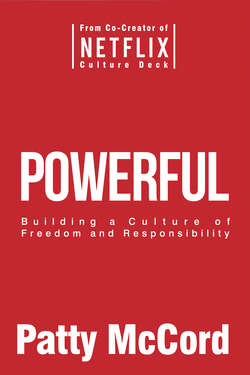Читать книгу Powerful - Patty McCord - Страница 11
На сайте Литреса книга снята с продажи.
Great Teams Relish a Challenge
ОглавлениеWhen I consult to start-ups, I’m most excited about working with those who’ve found that their venture money is starting to dry up and they’re facing really tough challenges; it’s tackling those that makes truly great teams. Great teams are made when things are hard. Great teams are made when you have to dig deep. When I’m hiring, I look for someone who gets really excited about the problems we have to solve. You want them to wake up in the morning thinking, God, this is hard. I want to do this! Being given a great problem to tackle and the right colleagues to tackle it with is the best incentive of all. One of my mantras is “Problem finders, they’re cheap!” Most people think that’s a really important role in the company: I’m the one who found that problem! Okay, good for you, but did you solve it? You want people who absolutely love problem solving.
Neil Blumenthal and Dave Gilboa, cofounders of Warby Parker, told me that it’s especially fun building the company now because it’s getting really complicated as they launch brick-and-mortar stores. They’ve got to integrate the experience of the stores with the experience of the online service, and that’s a real challenge. No wonder the brand is so successful. Some leaders might opt to coast on the growth already achieved, but they’re thrilled to be facing even harder problems.
Ask any very successful person what their fondest memories of their career are, and they will inevitably tell you about an early period of struggle or some remarkably difficult challenge they had to overcome. I had a great conversation about this with Tom Willerer, the former VP of product innovation at Netflix. He’s moved over to Coursera, the innovative online education provider, as chief product officer. When I asked him what he’s loved about helping build the company, he lit up, launching into a story about a seemingly impossible feat his team pulled off. At the start of the fiscal year, the executive team had determined that the company had to double its revenue by the end of the year. He and the product team decided they’d meet the goal by launching fifty new courses by that September, which he described as a Hail Mary pass. Two weeks before the launch date for the new courses, they still weren’t sure they could pull it off. They did, and the strategy worked beautifully. They saw an immediate hockey-stick uptick in earnings. Tom told me he joined a company that he wasn’t sure would even exist in five years because of the “hunger to climb a mountain.” He said, “I feel sometimes like I’m going to lose a limb doing this, but it will be worth it because I’m doing something important and adding something to the world, and that is what drives people.” I could not agree with him more. I believe that is the way that most people fervently want to feel about their work.
The prospect of helping to create a company that would provide employees that opportunity was the reason I joined Netflix, despite thinking I wouldn’t go to another start-up.
When I got a call at two in the morning back in 1997, I figured it must be Reed Hastings. Nobody else ever called me at two in the morning.
He said, “Were you sleeping?” And I said, “Yeah, of course I was. I’m normal! What’s up?”
Reed was not one to let a little sleep get in the way of a good idea, and he had shared many of them with me late at night when I worked with him at his start-up Pure Software. After he sold Pure, he’d gone back to school and I had started consulting. We both lived in the same town and we’d kept in close touch.
He said that he was going to join Netflix, and I told him, “Sounds like a good career move. Why are you telling me this at two in the morning?”
Then he asked me if I wanted to join him and I answered, “No way.” I’d had a great time at Pure, but I was done with the crazy highs and lows and insane hours. I also didn’t see how a tiny little company renting DVDs through the mail was going to succeed. I mean, really, Netflix was going to put Blockbuster out of business?!
But then Reed said, “Wouldn’t it be great if we created a company that we really both wanted to work at?” Now I was intrigued. At Pure I’d come in after the model had been fashioned. The opportunity to join in the invention this time was tantalizing.
“If we did that,” I asked him, “how would you know it was great?”
He said, “Oh, I’d want to come to work every day and solve these problems with these people.”
I loved the spirit of that. I think Reed expressed in that statement exactly what people most want from work: to be able to come in and work with the right team of people— colleagues they trust and admire—and to focus like crazy on doing a great job together.
